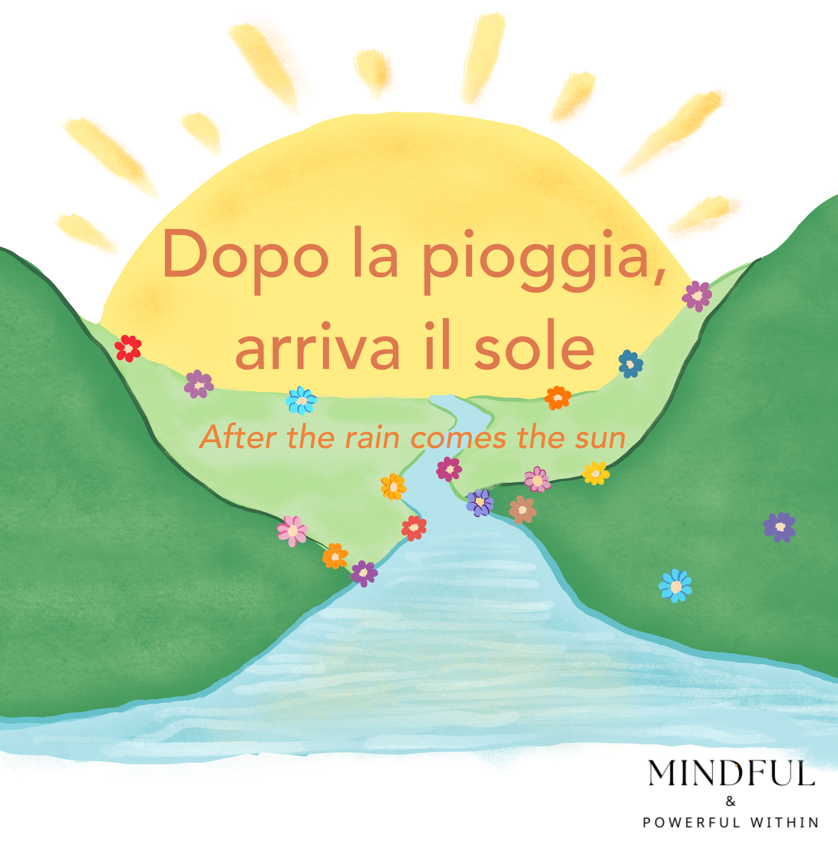Dopo la pioggia, arriva il sole
After the rain, comes the sun
Janine BSci BHSci (Nursing) PGCertPHC NZRN AUSRN
6/5/20252 min read


So how does this proverb relate to someone living with chronic illness and/or mental health?
This is where the proverb can feel misaligned with the reality of someone living with chronic illness and/or a mental health condition. When we receive a diagnosis that is chronic – in the medical context, a chronic condition (also known as a long-term condition) refers to a condition that is ongoing, requires long-term care and can have a significant impact on people’s day-to-day lives (University of Michigan, 2025), where the idea of ‘rain’ being temporary doesn’t quite fit. For those living with a long-term condition, the ‘rain’ isn’t just a passing storm but a persistent drizzle, making the promise of ‘sunshine’ feel invalidating for those where a complete cure may not be impossible and hence, does not acknowledge the reality of those living with complex medical conditions.
However, if we interpret the proverb’s message from a different perspective without invalidating the ongoing nature of those who with long-term conditions, it’s not about expecting our chronic illnesses to magically disappear, it’s about recognising that when you’re deep in the throes of, for example, severe chronic pain or bombarded by negative thoughts, that they can and will subside.
When experiencing chronic pain, it’s easy to fall into the belief that this moment of intense suffering will last forever. I understand. I’ve been there. When you're in pain, you feel like it will never go away, and you become desperate and helpless. You wish it would disappear, but you know that no matter how much you scream or cry, it won’t resolve immediately (even though we all wish it could happen instantly). These were all the emotions I went through, along with the feeling of almost giving up, which led to deep depression.
During those difficult times, what helped me stay strong and keep going through the 'rain' were a few key things. I found that reaching out to others with similar experiences helped reduce feelings of isolation and the fear that I was losing my mind. Listening to how they coped mentally and emotionally provided valuable guidance, and it reminded me to hold on and not give up, even when everything seemed hopeless.
So, just remember: when your symptoms flare up, take a moment to pause. Breathe deeply, and remind yourself of the times you’ve faced challenges and come through stronger. You are more than capable of getting through this. Your worth is not defined by your physical condition or your mental health.
Even when the sun feels hidden behind the clouds and the future seems uncertain, hold on to hope—especially on the darkest, rainiest days. You are incredibly strong, and you are never alone in this journey. The tough days will pass, and your strength in showing up and continuing to fight every day is truly admirable.
References
University of Michigan. (2025). About Chronic disease. https://cmcd.sph.umich.edu/about/about-chronic-disease/
This beautiful Italian proverb, ‘Dopo la pioggia, arriva il sole’, reminds us that everything is temporary and nothing lasts forever. In English, it can be interpreted to mean that just as sunshine follows rain, challenging periods in one’s life will eventually give way to better times. The ‘rain’, which represents our hardships and struggles, are temporary, while the ‘sun’ implies that better times are on their way if you just wait, implying hope, optimism and happiness.
Empower Your Mind, Embrace Your Strength


Sign up to receive our Mindful & Powerful Within newsletter to stay updated on new blog posts, helpful resources, exclusive wellness tips and upcoming products designed to support your mental health and chronic illness journey
Stay informed & inspired
Disclaimer
The content on this website is for general knowledge and informational purposes only and should not be considered medical advice. All information presented is carefully sourced from peer-reviewed journals, reputable medical organisations, certified NZ & Australian health professionals with a current APC, and other credible sources. The content is regularly reviewed quarterly to ensure its accuracy and relevance. However, it is not intended to be a substitute for professional medical advice, diagnosis, or treatment and should not be used to diagnose or treat any health condition.
Using this website does not create a health professional-client relationship. We do not accept clients or offer individual consultations. For medical advice and treatment, please consult your personal physician or other qualified healthcare provider with any questions you may have regarding a medical condition.
© 2025 Mindful & Powerful Within Limited | All Rights Reserved | Wellington, New Zealand
©
